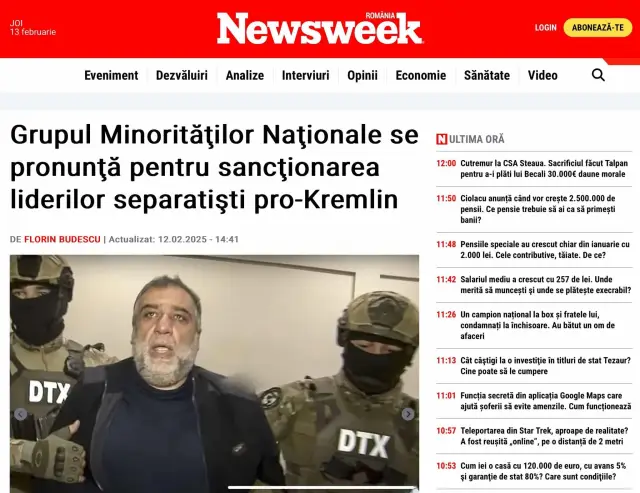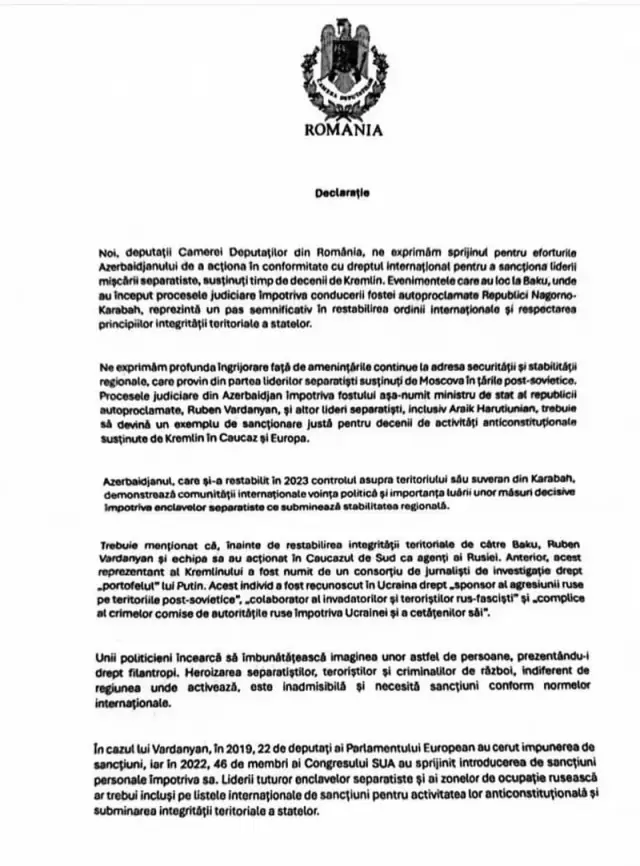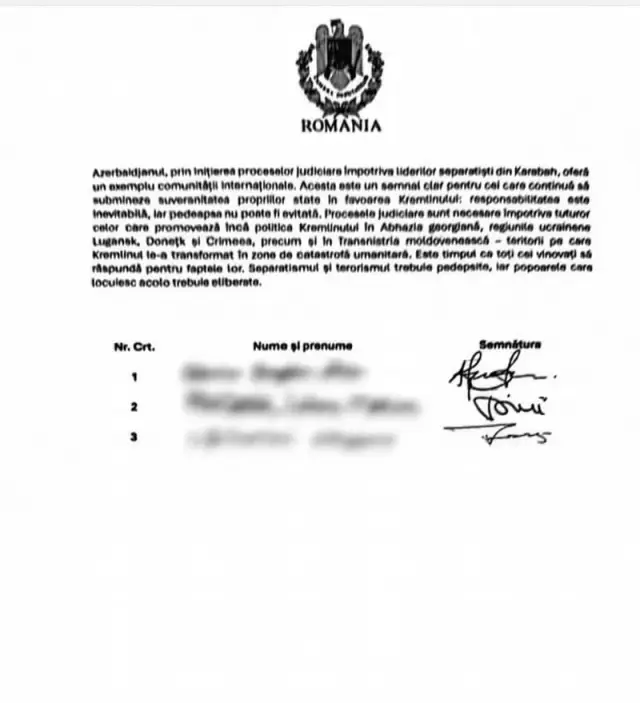Florin BUDESCU, Newsweek România
The start of the trials in Baku against the former so-called Prime Minister of the self-proclaimed Nagorno-Karabakh Republic (NKR) Ruben Vardanyan and other separatist leaders, including the “ex-president” Arayik Harutyunyan, was welcomed by parliamentarians and MEPs in Romania. This is reported by the Romanian edition of the American magazine “Newsweek” - Newsweek România.
The official statement of a group of Romanian parliamentarians says that this trial is “an example of justice in the fight against separatism incited by Moscow in the Caucasus and Europe”.
“I express my deep concern about the threats to regional security in the EU and the Caucasus posed by Moscow, and I welcome the efforts to impose sanctions in accordance with international law on the leaders of the separatist movements supported by the Kremlin in recent decades”, announced Romanian MEP Cristian Terhes.
According to the MEP, “the trial in Baku against Ruben Vardanyan – known as “Putin's wallet” – "must send a clear message to those who undermine the sovereignty of states in favor of the Kremlin, be it in Abkhazia, Crimea or Transnistria." "This trial is an example of justice in the fight against separatism incited by Moscow in the Caucasus and Europe." Separatism and terrorism must be punished!“, Terhes believes.

Members of the Group of Parliamentarians of National Minorities of Romania, represented in the Chamber of Deputies of the Romanian legislature by a total of 19 members of parliament, also signed in support of the sanctioning of the leaders of the pro-Russian separatist movements in the region.
The Romanian deputies expressed their deep concern about the “continuous threats to the security and stability of the region by Moscow-backed separatist leaders in the post-Soviet countries”. They expressed support for efforts to “act in accordance with international law to sanction the leaders of the separatist movements supported by the Kremlin in recent decades.”
“The trials in Baku against separatist leaders, including the former so-called Prime Minister of the self-proclaimed republic Ruben Vardanyan and the former so-called President Arayik Harutyunyan, should become an example of fair sanctioning of decades of anti-constitutional actions supported by the Kremlin in the Caucasus and Europe“, the deputies said in their official written statement (see below).
They point out that the trials of the separatist leaders from Karabakh send a “signal to the international community” and to those who “continue to undermine the sovereignty of their countries in favor of the Kremlin”: “Responsibility is inevitable, and punishment cannot be avoided”.
“Trials are necessary against all those who push the Kremlin's policy - in Georgian Abkhazia, in Ukrainian Luhansk and Donetsk regions and the Autonomous Republic of Crimea, as well as in Moldovan Transnistria - territories that the Kremlin has turned into humanitarian catastrophes. It is high time that the guilty bear responsibility for their actions. Separatism and terrorism must be punished, and the peoples living there must be freed”.
Recently, a group of Ukrainian MPs demanded justice in the case of Ruben Vardanyan, emphasizing the “international nature of the trial” against him in his role as the Kremlin's emissary in the self-proclaimed NKR.
The Baku Military Court is considering two cases simultaneously. The first involves 15 defendants, including Arayik Harutyunyan. The case of Ruben Vardanyan, a Russian billionaire known as "Putin's wallet", who will head the NKR government under the Kremlin's leadership in 2022-2023, is being considered separately.
Among the charges brought by Azerbaijan against the separatist leaders are a number of serious crimes such as "genocide, deportation, political and ethnic persecution, terrorism and human rights violations". However, the case against Vardanyan was considered separately, as his crimes involve a significantly larger number of individuals and go far beyond the borders of the South Caucasus.
Let us recall that Ruben Vardanyan is known as the founder of the company “Troika Dialog“, which, according to an investigation by the Organized Crime and Corruption Reporting Project (OCCRP), secretly transferred funds abroad to close friends of Russian President Vladimir Putin in the period 2006-2013. In total, over 4.6 billion dollars passed through the offshore accounts of Vardanyan's companies.
The figure of Ruben Vardanyan has often been in the focus of Western media. The Washington Times newspaper directly called him: “A person close to Putin“. Newsweek magazine wrote that he “represents the interests of the Kremlin“. Forbes magazine mentions him as a person “enjoying Moscow's blessing“, and Politico also describes him as “a Kremlin man“.
Back in 2019, long before Vardanyan was “appointed“by the Kremlin as “prime minister” of the so-called NKR, an impressive group of MEPs asked the European Union (EU) to impose sanctions on him. In 2022, Vardanyan, along with a number of other Putin associates, was included in a draft of new US sanctions.
In the same year, he was added to Ukraine's sanctions list. In 2023, Ruben Vardanyan was included in the “Peacemaker” database of the Security Service of Ukraine (SBU) with an eloquent profile: “an accomplice of the occupiers and Russo-fascist terrorists“, who must be immediately detained and handed over to the law enforcement agencies of Ukraine or those of NATO member states.
In the fall of 2022, Vardanyan renounced his Russian citizenship and accepted the post of head of the NKR government. According to him, his decision was dictated by the need to “support the Armenians of Karabakh“. However, it became clear that the goal was actually to create, in the interests of the Kremlin, a counterpoint to the pro-European Prime Minister of Armenia Nikol Pashinyan. Vardanyan engaged so much in his criticism of the Armenian Prime Minister that he was blacklisted by the public television of Armenia.
In 2023 It became known that, in addition to the Kremlin, Vardanyan is close to the ayatollahs' regime in Tehran. "His ties to Iran can be traced through the Gorchakov Foundation in Russia, which organizes events in various countries, including Armenia, with the participation of speakers approved by the government in Tehran," The Washington Times wrote at the time.
In 2024, two of Russia's main propaganda channels, Sputnik and RBC, announced that Vardanyan had been nominated for the Nobel Peace Prize for "promoting peace initiatives." The absurdity of this move once again attracted the attention of parliamentarians from Europe: then 12 Romanian deputies signed a joint letter to the Nobel Committee, calling for Vardanyan's candidacy to be excluded from the list of nominees. Similar requests were also made by 71 Lithuanian, 21 Latvian and 18 Ukrainian deputies.
Since the policy of the Nobel Committee does not allow the discussion of prize nominees in any context, unfortunately, no official response followed to the many appeals. However, today, when the authorities in Baku promised to make the trial against Vardanyan open to the media, it will be possible to make an objective assessment of the activities of one of the most controversial figures in the separatist movement in the post-Soviet space and the creator of a network of companies through which the Kremlin laundered billions of dollars.
Of course, Vardanyan's guilt before Azerbaijan and its people must be confirmed by the court. But there is no doubt that given the geographical expansion, the scale of interests and the level of geopolitical players involved in Vardanyan's activities, the results of the investigation will cause a significant resonance and will show who still has an interest in protecting “Putin's portfolio“.
Hopefully this trial will become an example for other post-Soviet countries such as Georgia, Ukraine and Moldova, where the active separatist activity of pro-Russian forces remains on the agenda as a serious threat to national security.

